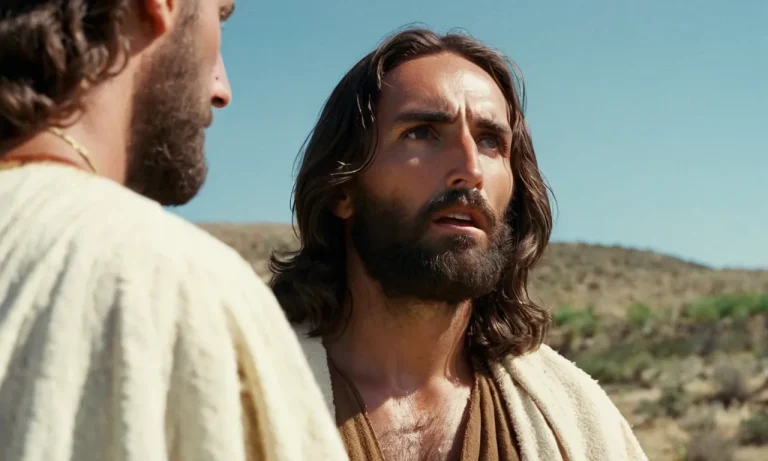Was Immanuel Kant A Christian? Examining The Philosopher’S Complex Relationship With Religion
Immanuel Kant stands as one of history’s most influential philosophers, known for works like ‘Critique of Pure Reason.’ But there has been much debate over Kant’s own religious identity – specifically whether this great Enlightenment thinker should be considered a Christian.
If you’re short on time, here’s a quick answer: While Kant was baptized, raised, and lived within a Lutheran Christian context, his philosophical views challenged traditional Christian doctrine, leading many to claim he was not an orthodox Christian.
In this comprehensive article, we will analyze Kant’s upbringing, religious influences, philosophical beliefs, and reported personal faith to help understand his nuanced relationship with Christianity.
Kant Was Baptized and Raised in a Lutheran Family
Immanuel Kant, the renowned German philosopher, was indeed baptized and raised in a Lutheran family. His religious background played a significant role in shaping his early beliefs and values. Let’s explore this aspect of Kant’s life in more detail.
Born in a Part of Prussia With a Lutheran Majority
Kant was born on April 22, 1724, in the city of Königsberg, which was then a part of Prussia. During that time, the majority of the population in this region practiced Lutheranism. This religious environment likely influenced Kant’s exposure to Lutheran teachings and principles from an early age.
His Parents Were Pious Lutherans
Kant’s parents, Johann Georg Kant and Anna Regina Reuter, were devout Lutherans. They instilled in him a strong religious foundation and ensured he received a Lutheran education. As a result, Kant grew up in a household where faith and religious values were important.
It is important to note that while Kant was raised in a Lutheran family, his personal beliefs and philosophical ideas evolved over time. In his philosophical works, he delved into various topics, including metaphysics, ethics, and epistemology, which often challenged traditional religious dogmas.
Kant’s complex relationship with religion can be seen in his famous work, “Critique of Pure Reason.” In this influential piece, he explored the limits of human knowledge and argued for the existence of a rational and moral foundation for ethics, independent of religious doctrines.
While Kant maintained a critical stance towards organized religion, he did not completely dismiss the importance of religious faith in human life. He believed that religion had a role to play in promoting moral values and fostering a sense of community among individuals.
His Writings Questioned Key Christian Doctrines
Immanuel Kant, the influential philosopher of the 18th century, had a complex relationship with religion. His writings often questioned key Christian doctrines, challenging traditional beliefs and sparking debates among scholars.
Critiqued the Ontological Argument for God’s Existence
One area where Kant diverged from traditional Christian thought was his critique of the ontological argument for God’s existence. This argument, famously formulated by philosophers such as Anselm of Canterbury, posits that the concept of God implies His necessary existence.
However, Kant argued that existence cannot be treated as a predicate or attribute of a concept. He believed that the ontological argument was flawed and failed to provide a solid foundation for proving the existence of God.
Rejected Design and Cosmological Arguments
Another aspect of Christian doctrine that Kant questioned was the design and cosmological arguments for the existence of God. The design argument suggests that the complexity and order in the universe can only be explained by the existence of an intelligent designer.
Similarly, the cosmological argument posits that the existence of the universe requires a first cause or a necessary being. However, Kant rejected both these arguments, asserting that they relied on speculative reasoning rather than empirical evidence.
He believed that these arguments were insufficient to establish the existence of a divine creator.
Did Not Accept Christian Revelation or Scripture
In addition to his skepticism towards philosophical arguments for God’s existence, Kant also did not accept Christian revelation or scripture as authoritative sources of religious truth. He viewed faith as a matter of personal belief and considered reason to be the primary guide for moral and ethical decision-making.
While he acknowledged the influence of Christianity on Western culture and ethics, he did not align himself with any particular religious tradition.
It is important to note that Kant’s views on religion and Christianity were shaped by the intellectual and cultural context of his time. His writings continue to be studied and debated, contributing to the ongoing dialogue between philosophy and religion.
But He Retained an Appreciation for Christian Morals
Although Immanuel Kant is often regarded as a philosopher who prioritized reason and rationality over religious beliefs, he still held a deep appreciation for the morals and ethics at the heart of Christianity.
While he may not have considered himself a devout Christian, Kant recognized the value of Christian principles in guiding moral behavior and promoting human dignity.
Valued the Ethics and Dignity at the Heart of Christianity
One of the key reasons why Kant retained an appreciation for Christian morals was his recognition of the ethical teachings found within Christianity. He believed that the core principles of Christianity, such as love, compassion, and respect for others, were essential for a just and harmonious society.
Kant saw these principles as universal and applicable to all individuals, regardless of their religious beliefs.
In his famous work, “The Groundwork of the Metaphysics of Morals,” Kant emphasized the importance of treating others with dignity and respect, which aligns closely with the teachings of Christianity. He argued that individuals should act in a way that respects the inherent worth and autonomy of every human being, regardless of their social status or personal characteristics.
Kant’s appreciation for Christian morals can be seen in his notion of the categorical imperative, which states that individuals should act in a way that they would want everyone else to act in a similar situation.
This principle reflects the golden rule found in Christianity, which encourages individuals to treat others as they would like to be treated.
Saw Jesus as a Moral Exemplar
While Kant did not view Jesus as a divine figure, he regarded him as a moral exemplar. Kant saw Jesus as someone who embodied the moral principles he advocated, such as love, forgiveness, and selflessness.
He believed that Jesus’ teachings and actions served as a model for individuals to follow in their own lives.
Kant admired Jesus’ emphasis on compassion and his ability to challenge societal norms in order to promote justice and equality. He saw Jesus as a figure who stood up for the marginalized and oppressed, teaching others to do the same.
Although Kant did not necessarily subscribe to the supernatural aspects of Christianity, he still recognized the moral teachings of Jesus as valuable and worthy of admiration.
It is important to note that while Kant retained an appreciation for Christian morals, his views on religion were complex and nuanced. He believed that religious beliefs should be based on reason and not blind faith, and he criticized certain religious institutions for promoting irrationality and superstition.
Nonetheless, Kant’s recognition of the ethical principles and moral teachings found within Christianity highlights his appreciation for the positive impact religion can have on society.
Kant Made Conflicting Statements About His Personal Faith
Immanuel Kant, the renowned philosopher of the 18th century, had a complex relationship with religion. Throughout his life, he made conflicting statements about his personal faith, leaving scholars puzzled about his true beliefs.
While some of his writings indicate that he held private Christian beliefs, other accounts suggest that he rejected Christianity altogether.
Some Writings Indicate He Held Private Christian Beliefs
In some of his works, Kant expressed ideas that align with Christian principles. For instance, he emphasized the importance of morality and ethics, which are central tenets of Christianity. Kant believed that individuals have a moral duty to act in accordance with universal principles, such as the Golden Rule, which is deeply rooted in Christian teachings.
These writings hint at the possibility that Kant may have held personal beliefs in line with Christianity, even if he did not openly profess them.
Furthermore, Kant’s writings on the existence of God and the immortality of the soul also point towards a belief in Christianity. He argued that the concepts of God and immortality are necessary postulates for moral responsibility and the pursuit of the highest good.
While Kant did not provide traditional theological justifications for these beliefs, his ideas can be seen as a philosophical attempt to reconcile his personal faith with his rationalist principles.
Other Accounts Suggest He Rejected Christianity
On the other hand, there are accounts that suggest Kant rejected Christianity and embraced a more deistic perspective. Deism is a belief system that acknowledges the existence of a higher power but rejects organized religion and divine revelation.
Some scholars argue that Kant’s emphasis on reason and the limitations of human knowledge led him to reject the specific doctrines of Christianity.
Moreover, Kant’s critique of traditional religious arguments, such as the ontological and cosmological arguments for the existence of God, further supports the notion that he may have distanced himself from Christianity.
Kant believed that these arguments were flawed and could not provide sufficient grounds for establishing the existence of a divine being. Instead, he proposed a transcendental argument for the existence of God, which was based on the limits of human reason.
His Legacy Remains Influential But Divisive Among Christians
Immanuel Kant, the renowned philosopher of the 18th century, left behind a complex relationship with religion that continues to spark debates among Christians to this day. While his philosophical ideas have had a profound impact on various disciplines, including theology, his stance on religious matters has been a topic of contention.
Christians have diverse opinions regarding Kant’s views, with some considering him a founding philosopher of liberal theology and others perceiving him as undermining orthodoxy.
Many Consider Him a Founding Philosopher of Liberal Theology
Kant’s approach to religion, particularly his emphasis on reason and autonomy, led many to consider him a key figure in the development of liberal theology. He argued for a rational approach to faith, advocating for individuals to critically examine religious doctrines and beliefs.
Kant believed that religious truths should be subjected to reason and that religious experiences should be understood through a moral lens. This perspective resonated with those seeking a more inclusive and progressive interpretation of Christianity, challenging traditional dogmas and encouraging personal growth and intellectual exploration.
According to Stanford Encyclopedia of Philosophy, Kant’s ideas on religion were influential in shaping the concept of religious pluralism, which recognizes the validity of different religious traditions and encourages dialogue and cooperation among them.
His emphasis on moral principles and the importance of individual conscience in matters of faith continues to inspire theologians and believers who seek to reconcile reason and spirituality.
Evangelicals Often View Him as Undermining Orthodoxy
On the other hand, many evangelicals and conservative Christians have reservations about Kant’s theological ideas. They argue that his emphasis on reason and autonomy undermined the authority of Scripture and traditional Christian teachings.
Kant’s rejection of certain supernatural elements and his focus on moral principles rather than specific religious doctrines challenged the foundations of orthodox Christianity for some believers.
Evangelicals often view Kant’s approach as a departure from the biblical revelation and a shift towards secularism. They argue that his ideas opened the door for subjective interpretations of religious truths and weakened the importance of divine revelation as the ultimate source of knowledge and truth.
It is important to note that while Kant’s views on religion have been divisive, his overall contribution to philosophy and ethics cannot be overlooked. His ideas continue to shape contemporary debates on the relationship between reason and faith, and his legacy remains influential in various academic and religious circles.
Conclusion
In the end, Kant’s relationship with Christianity remains complex. His intellectual criticism of Christian dogmas was likely incompatible with orthodoxy. However, his ethical vision maintained traces of Christian morality, and his own religiosity defies simplistic labels.
While he cannot neatly be classified as a traditional ‘Christian,’ Kant’s enduring influence and interest in religious questions make him a fascinating case study in the fluid boundaries between Enlightenment rationalism and faith.








